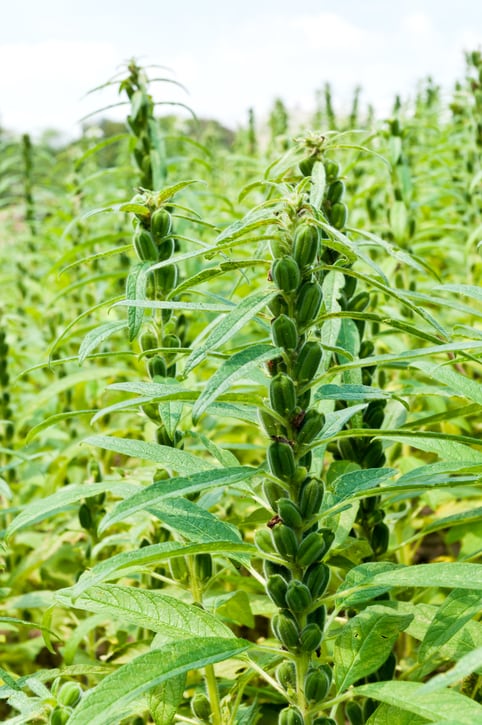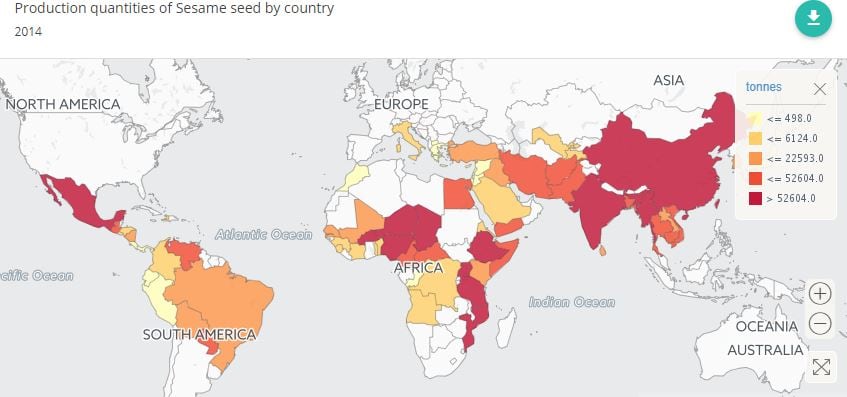
The global sesame seed market is worth $8 billion (€6.8bn) annually.
But, according to Equinom, something has been limiting the growth of this market for years: sesame seeds grow in pods, which split open when they begin to dry, meaning up to half of the seeds can be lost before being picked.
This has put the brakes on mechanised harvesting techniques - producers cut the still-green pods and then leave them to dry on the ground. It also means that cultivation has almost exclusively been concentrated in in developing countries where manual labour is in cheap supply.
Vice president and business development chief at Equinom Avi Posen said its algorithms have “solved this natural barrier so that sesame becomes a profitable crop that could be grown anywhere”.
“We will see a completely dynamic shift in where sesame is sourced from. Our vision is that in five years from now, there will be a dramatic change in global supply and demand dynamics for sesame.”
In 2016 global production of sesame was five million tonnes produced on 9.5 million hectares of land.
The top ten producer countries are: Tanzania, India, Sudan, China, Myanmar, Nigeria, Burkina Faso, Ethiopia, Chad and South Sudan (2014 FAOSTAT data)
Around 70% of global production is crushed for sesame oil, while around 15% is used for tahini (sesame paste) and around 15% is used as a food ingredient.
Equinom’s variety yields one metric ton per acre – conventional varieties are less than half of this, said Posen, and no specialised machinery, apart from a combine harvester, is required.
Crop trials “in the low hundreds of acres” are already underway in the US and Australia and are being scaled up. It expects to have several thousands of acres in 2018.
Equinom's non-GM variety, developed using DNA sequencing, big data processing and proprietary algorithms, is expected to be available on the market in 2019.
Founder and CEO Gil Shalev, who has a PhD in genetics and plant breeding from the Hebrew University, said the firm did not oppose GM technology, but traditional precision breeding methods allowed it to control multiple traits, leading to this sesame variety.
It recently got a significant financial boost for this - and other projects involving high protein pulses among other crops- with a $4m (€3.4m) investment from Israeli private equity firm Fortissimo Capital.
It has also already signed multi-year contracts with hummus manufacturer Sabra Dipping Company, a joint venture of PepsiCo and the Strauss Group, as well as a deal with multi-billion dollar Japanese behemoth Mitsui, although precise details of either have not yet been made public.
Open sesame

The firm, headquartered in the Givat Brenner Kibbutz in central Israel, carefully chose the first regions to trial the seeds. Australia made sense thanks to its climate and close proximity to Asia, the world’s biggest user of sesame oil, as did the US because sesame can be grown “anywhere that cotton grows” and uses around one third less water. It therefore offered a way for highly industrialised US cotton farmers to diversify their output.
“We would also like to start working in environments where intellectual property is respected,” Posen added.
On the customer and consumer demand side, Equinom plans on targeting “sophisticated buyers, like the Japanese” who look for reproducibility, traceability and quality assurance.
What about current farmers?
But does switching production to more expensive, developed countries ultimately mean a higher price tag – and what about current smallholder farmers who stand to lose their livelihoods?
The price won’t necessarily rise – at least not in the long term.
“The reason corn is not grown in Africa is because it’s cheaper to grow it in the US, as ridiculous as that sounds,” said Shalev. “The same applies to sesame. Once it becomes an industrial crop, it will be cheaper to grow it in industrial environment. That may take time but that’s the direction we’re going in.”
As for the fate of current smallholders, Posen likened the impact to that well-known disruptive innovation, the car. At the start, it put wagon drivers out of a job… until they modernised.

“It will force changes in way things are done,” he said.
The issue is not so much about the seeds’ affordability but rather the conditions of use. Equinom’s variety is profitable in economies of scale; not the case for smallholders with one acre of land and no combine harvester.
“Once you change that setting, the seeds become affordable and profitable,” said Posen. “We have a very high interest, and also a moral interest, in becoming involved in this project in emerging countries.”
According to Shalev, it would be an opportunity for Africa’s economy to industrialise. Current producer regions, such as Africa, would also remain excellent for sesame production in terms of climate and available land, added Shalev.
Meanwhile, whether the seeds offer a higher value crop for mechanised farmers was, at this pre-commercial stage, “a tricky question” to answer. “Agricultural farmers have lots of criteria that are not directly linked to the profitability of crop,” said Shalev, such as water costs and the benefits of having diversified crops.
Equinom didn't rule out the possibility of further precision breeding with sesame seeds, depending on market demand.
“Imagine industry looking for a sesame seed with a high oil content, a specific colour or reduced bitterness," said Posen. "Now we know how to control several crop traits, we could answer those problems."
